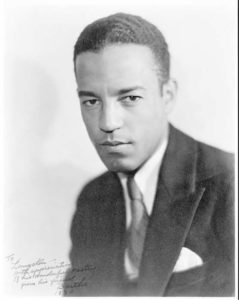
Richmond Barthe
*On this date, in 1901, Richmond Barthe was born. He was a Black sculptor artist.
From Bay Saint Louis, Mississippi, his father died at 22, when he was only one month old. His mother was very devoted and significantly influenced his aesthetic development. When Barthe was twelve, his work was shown at the county fair in Mississippi, and he continued to develop remarkably as an artist. At eighteen, having moved to New Orleans, he won first prize for a sketch he submitted in the Parish (county) competition.
Lyle Saxon of the Times-Picayune newspaper tried unsuccessfully against Jim Crow policy to register Barthe in an art school in New Orleans. Yet in 1924, with the aid of a Catholic priest, he was admitted to the School of the Art Institute of Chicago. During the next four years, Barthe followed the curriculum structured for majors in painting. During his senior year, he was introduced to sculpture by his anatomy teacher.
This was carried out to allow a more enhanced understanding of the third dimension as a way of broadening his painting. According to Barthe, this was the beginning of his long career as a sculptor. By 1934, he gave his first solo show at the Caz Delbo Galleries in New York City, and many other exhibitions and commissions followed. His pieces are additions to many important collections, including the Whitney Museum of American Art (African Dancer), the Metropolitan Museum of Art, the Pennsylvania Museum of Art, the Virginia Museum of Fine Arts, and the Museum of the Art Institute of Chicago (The Boxer).
Barthe’s commissions include two portrait busts, a garden sculpture for the Edgar Kaufman house Falling Water, designed for Frank Lloyd Wright, and an Othello modeled after Paul Robeson for Actor’s Equity. In 1947, he left his role as one of American art's leading “moderns” by moving to Jamaica in 1969. After traveling to other worlds to study classic Renaissance masters and smell the roses of life in Europe, Barthe returned to New York in 1976. He moved to Altadena, California, where he lived until he died in 1989.
The Encyclopedia of African American Heritage
by Susan Altman
Copyright 1997, Facts on File, Inc. New York
ISBN 0-8160-3289-0